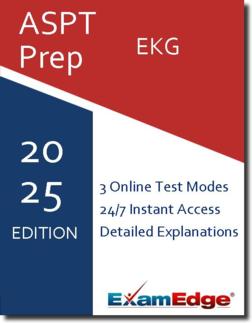ASPT EKG (EKG) Practice Tests & Test Prep by Exam Edge - Test Reviews
Based on 40 Reviews
- Real Exam Simulation: Timed questions and matching content build comfort for your ASPT EKG test day.
- Instant, 24/7 Access: Web-based ASPT EKG Technician practice exams with no software needed.
- Clear Explanations: Step-by-step answers and explanations for your ASPT exam to strengthen understanding.
- Boosted Confidence: Reduces anxiety and improves test-taking skills to ace your ASPT EKG Technician (EKG).

ASPT EKG (EKG) Practice Tests & Test Prep by Exam Edge - Review
ASPT EKG Technician - Reviews
Excellent
Based on
200
reviews
See why our users from 154 countries love us for their exam prep! Including 40 reviews for the ASPT EKG exam.
Exam Edge is an Industry Leader in Online Test Prep. We work with our Institutional Partners to offer a wide array of practice tests that will help you prepare for your big exam. No Matter how niche field of interest might be, were here to help you prepare for your test day.
| 2.8M | 4.5M | |
| Users | Tests Taken | |
| 100K | 19 | |
| Unique Exams | Years in Business | |


